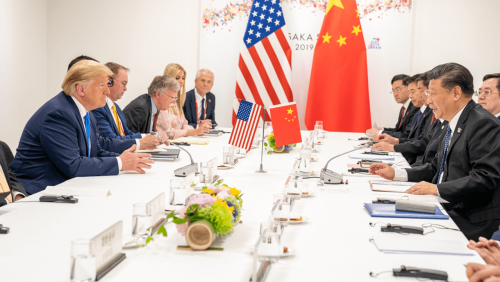Back to Baseline: Views of China's Development as a Threat Recede

Four in ten Americans (38%) see the development of China as a world power as a critical threat, in line with how Americans have felt about China’s development since 2004.
In recent years, tensions between the United States and China have been running high. The multi-year trade war, competition over Chinese claims in the South China Sea, and the international contest over 5G networks have all put China on the front page in the United States. Would the American public, along with US policymakers, turn on China as well?
Not according to the Council’s latest survey, conducted January 10-12, 2020. Four in ten Americans (38%) see the development of China as a world power as a critical threat, in line with how Americans have felt about China’s development since 2004.
Threat of China as a World Power
Do you think the development of China as a world power in the next 10 years is a critical threat, an important but not critical threat, or not an important threat at all?
Source:
January 10-12, 2020 | n = 1,019
Chicago Council Surveys
Additionally, the partisan gap that emerged in 2019 has quickly snapped shut. Last year, a majority of Republicans (54%) named China’s rise as a critical threat, while only minorities of Democrats (36%) and Independents (40%) said the same. Today, there is little difference among these partisan groups, with similarly-sized minorities of Republicans (41%), Democrats (37%), and Independents (37%) labeling China’s development a critical threat.
What’s behind this sudden change of heart? One possible cause is the signing of the Phase 1 trade agreement between the US and China on January 15. In the days leading up to that signing, during which the survey was fielded, news coverage of the deal was generally positive; criticisms came following the signing and release of the agreement’s text. Moreover, relatively few Americans see China as posing the greatest threat to US security. In the Council’s latest survey, only 16 percent of Americans choose China in a list of potential threats to the US. That puts it third in line behind Russia (28%) and Iran (33%), and is similar to public views from February 2019, when 18 percent named China the greatest threat to US security. If the spike in Republican concerns last summer focused on economic concerns rather than US security, the mending of US-China trade relations will serve to keep public concerns at a relatively low level.
Another interpretation is that American attentions have shifted from the trade conflict with China to the possibility of a military conflict Iran. The high level of tensions between the US and Iran following the US assassination of Qasem Soleimani certainly dominated news coverage in the days after. Subsequently, domestic attention has remained focused on the ongoing impeachment proceedings and the pending Democratic Iowa caucuses.
While this news is undoubtedly welcome to supporters of closer US-China ties, more bumps in the road lie ahead. The US is entering a long election year, and Democratic candidates are sounding a consistently hawkish note on China. Could the Democratic public follow their lead in 2020? If they do, the Chicago Council Survey team will find out.

